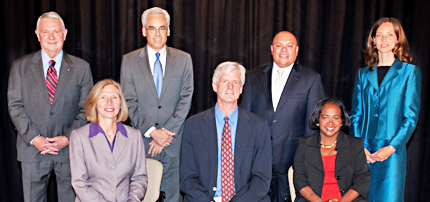City Council
Court halts $354 million development subsidy
Austin City Manager: Dallas discard vs Austin retread
They’re off and running for council
Proposition 3 Advocates Falsely Slam RECA
Proposition 3 Advocates Falsely Accuse RECA
Group alleges ‘rumor’ of $100,000 pledge by Real Estate
Council to defeat Proposition 3, but RECA says not so
by Ken Martin
© The Austin Bulldog 2012
Posted Wednesday, September 12, 2012 10:25pm
An e-mail received early this morning from Austinites for Geographic Representation (AGR), that was titled "A Very Stinky Rumor" turned out to be stinky indeed—as in false.
Or so says the Real Estate Council of Austin.
The AGR e-mail stated, "Rumors are flying that large real estate investors at the Real Estate Council of Austin (RECA) just pledged $100,000 to stop Prop 3—the people's plan for geographic representation—by running a confusion game with Prop 4."
No-Change Option Surfaces in Ballot Debate
Former Council Member Bob Binder opposes both
options on the ballot for geographic representation
by Ken Martin
© The Austin Bulldog 2012
Posted Tuesday, September 11, 2012 2:41pm
Monday's lunchtime debate drew about 40 people to hear arguments for not just Propositions 3 and 4 on the November 6 ballot, but reasons why voters should once again turn thumbs down to both plans for geographic representation in City Council elections.
 The program was hosted by the Central Texas Democratic Forum, emceed by attorney Chuck Herring of Herring & Irwin LLP.
The program was hosted by the Central Texas Democratic Forum, emceed by attorney Chuck Herring of Herring & Irwin LLP.
Until this debate, virtually all discussions about how council members should be elected have focused on the problems with the current all-at-large system and advocated for one of two proposed plans for change.
The Election Wars Have Begun
Interest in how council members elected
running high, as face-off debates abound
by Ken Martin
©The Austin Bulldog 2012
Posted Sunday, September 9, 2012 9:01pm
If you're concerned with how your local city government officials get elected—and how any change in the election system might affect your interests—you will have numerous opportunities to hear a thorough airing of the issues.
Two propositions on the city’s November 6 ballot offer choices for getting away from the all-at-large system we've had since 1953, when the council had five places and the elected council members chose the mayor from among their ranks. The council was expanded to seven places beginning with the 1969 election but it wasn’t until 1971 that citizens could directly elect their mayor.
Today, there are some who advocate keeping the election system we’ve got. However, the two major factions striving for change both advocate a new system of electing council members.
How to change is where they differ.
Your Guide to Proposed City Charter Amendments
What’s on the ballot, how much it will cost taxpayers, and
by Ken Martin
© The Austin Bulldog
Posted Thursday August 30, 2012 8:20pm
 When Austin voters go to the polls starting October 22 for the November 6 general election, they’ll be faced with a potentially bewildering 18 propositions on the City of Austin’s portion of the ballot.
When Austin voters go to the polls starting October 22 for the November 6 general election, they’ll be faced with a potentially bewildering 18 propositions on the City of Austin’s portion of the ballot.
And voters won’t see those propositions until they’ve finished wading through voting for federal, state and local candidates, and deciding whether to support Central Health’s proposed 5 cent tax hike to help fund a new medical school in Austin.
The Austin City Council and a number of citizens are really, really hoping voters don’t just vote a straight party ticket and go home. At stake are $385 million in seven bond propositions, 10 separate proposals to change the City Charter, and one proposition to allow emergency medical personnel to get the same civil service protections as police and firefighters.
Other down-ballot taxing jurisdictions on the ballot are also hoping to keep the voters attention long enough to mark the entire ballot, including Austin Independent School District, Austin Community College, and a bunch more.
In an effort to de-mystify the Austin portion of the ballot, The Austin Bulldog is providing the exact ballot language for each of the 10 propositions involving charter amendments and the emergency medical services proposition, and links to the ordinances that placed each of those on the ballot.
Some Council Members’ Finances Change Significantly
Mayor carries campaign debt, Riley adds domestic partner,
Martinez adds investments, Cole reports spouse separately,
and Tovo pays off $528,000 in real estate loans
by Ken Martin
© The Austin Bulldog 2012
Posted Wednesday, August 22, 2012 10:05am
 City Council Member Chris Riley, an attorney, initially failed to comply with the Austin City Code by not fully reporting the financial activity of his domestic partner in his latest Statement of Financial Information.
City Council Member Chris Riley, an attorney, initially failed to comply with the Austin City Code by not fully reporting the financial activity of his domestic partner in his latest Statement of Financial Information.
The Austin Bulldog’s June 2, 2011, report covered similar discrepancies in Riley’s annual financial statements for 2009 and 2010.
Riley’s mid-year Statement of Financial Information covering the first six months of 2012, filed July 27, indicates that his domestic partner, Denise Brady, is an “attorney/state employee.” The report contains no other information as to Brady's specific employer, her income, investments, real property interests, debts, or boards of directors on which she may be serving, as required by City Code Sections 2-2-72(A) and 2-7-2(10).







